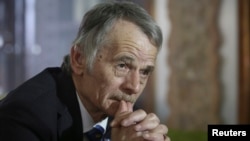The leader of the Crimean Tatars was in the United States this week to voice his concerns about what he sees as a problematic future for his people and for Crimea following Russia's annexation of the the Black Sea peninsula.
Mustafa Dzhemilev is a member of the Ukrainian parliament who formerly headed the Mejlis, the Crimean Tatars' legislative body. He told VOA's Ukrainian service in Washington Thursday that the main problem the Crimea Tatars face today is the presence of Russian troops in the peninsula and the threat they represent to the unity of Ukraine.
Earlier in the week, Dzhemilev, a veteran human rights campaigner who served six sentences in Soviet prison camps, spoke at an informal U.N. Security Council session in New York. He expressed fears the Tatars could be the targets of violence under Russian rule, and said he would like to see international peacekeepers deployed to Crimea.
The Lithuania delegation organized the informal Security Council session, which Russia boycotted, calling it "a biased propaganda show."
The Crimean Tatars were deported en masse in by Soviet dictator Josef Stalin in 1944 for alleged collaboration with Nazi Germany. They only began returning to their historical homeland on the peninsula in 1991. Today, they make up 12 percent of Crimea's nearly two million people.
According to Moscow, more than 96 percent of those who voted in the March 16 Russian-run referendum on Crimea's status voted in favor of its integration into Russia, and voter turnout was 83 percent. Dzhemilev insists the turnout was only 32 percent, and that the Crimean Tatars boycotted the vote en masse.
Dzhemilev said the Crimean Tatars will continue insist that they remain part of an autonomous territory within Ukraine.
"We declared this 23 years ago at the moment that Ukraine declared its independence. We see ourselves as a national territorial autonomy within the framework of the Ukrainian state."
Russia, however, is not offering that option. On April 18, all of Crimea's residents will automatically become Russian citizens unless they have already submitted an application stating that they want to retain Ukrainian citizenship.
Mustafa Dzhemilev is a member of the Ukrainian parliament who formerly headed the Mejlis, the Crimean Tatars' legislative body. He told VOA's Ukrainian service in Washington Thursday that the main problem the Crimea Tatars face today is the presence of Russian troops in the peninsula and the threat they represent to the unity of Ukraine.
Earlier in the week, Dzhemilev, a veteran human rights campaigner who served six sentences in Soviet prison camps, spoke at an informal U.N. Security Council session in New York. He expressed fears the Tatars could be the targets of violence under Russian rule, and said he would like to see international peacekeepers deployed to Crimea.
The Lithuania delegation organized the informal Security Council session, which Russia boycotted, calling it "a biased propaganda show."
The Crimean Tatars were deported en masse in by Soviet dictator Josef Stalin in 1944 for alleged collaboration with Nazi Germany. They only began returning to their historical homeland on the peninsula in 1991. Today, they make up 12 percent of Crimea's nearly two million people.
According to Moscow, more than 96 percent of those who voted in the March 16 Russian-run referendum on Crimea's status voted in favor of its integration into Russia, and voter turnout was 83 percent. Dzhemilev insists the turnout was only 32 percent, and that the Crimean Tatars boycotted the vote en masse.
Dzhemilev said the Crimean Tatars will continue insist that they remain part of an autonomous territory within Ukraine.
"We declared this 23 years ago at the moment that Ukraine declared its independence. We see ourselves as a national territorial autonomy within the framework of the Ukrainian state."
Russia, however, is not offering that option. On April 18, all of Crimea's residents will automatically become Russian citizens unless they have already submitted an application stating that they want to retain Ukrainian citizenship.










